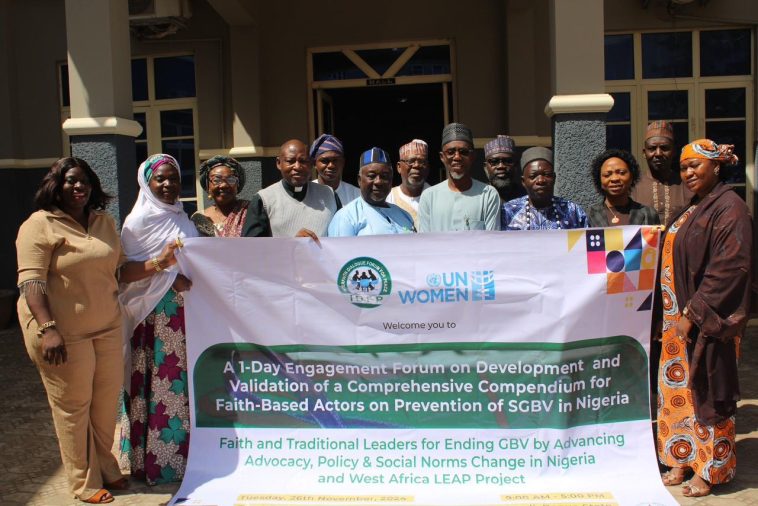From Dooshima Terkura, Makurdi
A Non Governmental Organization NGO, International Dialogue Forum for Peace (IDFP) in collaboration with UN WOMEN has advocated the involvement of religious and traditional leaders in Benue state in the fight against cases of Gender Based Violence, (GBV) in the state.
The Co-chair, Inter-Faith Dialogue Forum for Peace on Gender-Based Violence in Nigeria, Rev. Abainitus Hamman Jr, made the call at a 1-day Engagement Forum on Development and Validation of a Comprehensive Compendium for Faith Based Actors on Prevention of SGBV in Nigeria held in Makurdi in Makurdi, Benue State.
The project is titled “Faith and Traditional Leaders for Ending GBV by Advancing Advocacy, Policy and Social Norms Change in Nigeria and West Africa LEAP Project.” It’s a six months project to be implemented in Benue , Bauchi, Kaduna and Ekiti states.
Hamman who explained that the gathering was to address one of the most pervasive and devastating issues facing the society noted that
“In our country, violence against women, girls, and other marginalized groups continues to be a severe violation of their dignity and basic rights.
He said from physical assault and domestic violence to sexual harassment and harmful traditional practices, the scourge of gender-based violence destroys lives, families, and communities.
He said as faith leaders, they are called upon not only to offer prayers but to take active and concrete steps to address the epidemic.
According to him, every major world religion, including Islam and Christianity, holds the sacred principle of protecting human dignity at its core and yet, despite these teachings, gender-based violence remains rampant in the society.
He said it was painful that religious communities are not always seen as champions of women’s rights and protection from violence insisting that the narrative must change. “Faith communities have a profound influence on shaping societal norms, behaviors, and attitudes. We must leverage this influence to condemn gender-based violence unequivocally and promote the protection and empowerment of women and girls.
“Today, we call upon all religious leaders, Christian, Muslim, traditional, and others to join forces and take action, build a society where gender-based violence is not tolerated, where survivors are supported, and where prevention is at the heart of our community values.
He stated that they must condemn all forms of GBV, promote education and awareness in their communities about the harmful consequences of GBV and the importance of mutual respect between men and women.
He further urged them to provide support for survivors in terms of giving them solace, safety, and support within their communities as well as offering shelter, counseling, and other practical assistance and work with governments and civil society to ensure that policies and laws protecting women and girls are implemented and upheld.
They must also encourage men’s involvement and also engage men and boys in discussions about gender equality and non-violence for true transformation.
Giving an overview of the project, the Co-Secretary IDFP and Co Project Director Imam Shefiu Majemu, quoted a UN WOMEN report stating that 43 percent cases of child early and forced marriage, have been recorded while 23 million girls and women married as children.
He said the project seeks to develop effective mapping tools to source relevant data of GBV prevention Actors in West Africa for a better understanding of the ecosystem and to develop and publish regional accountability framework for traditional and religious leaders on GBV and the promotion of SRHR.
The Co-Project Director said it is expected that at the end, there would evolve a Faith Based Prevention Actors using IDFP existing and new networks in the four states initialized while a comprehensive compendium of SGBV prevention actors would be developed, published, referenced and verified as tool for intervention.
While taking participants through the Prevention of GBV and Sexual Exploitation and Abuse (PSEA), the resource person, Chief Mrs Justina Ngwogobia, called on families to instill good morals in their children especially the boy child.
She said while the world is focusing on the girl child in the discussion of GBV, they have abandoned the boy child. “Let us train the boy child to be a good member of the society and a good husband,” she said insisting that involving the men and boy in GBV discussions and activities would go a long way to curtail cases of GBV.
The stakeholders drawn fron the religious and traditional institutions appreciated IDFP and UN WOMEN for the program and pledged their commitment to activities that would end GBV in the state. They also promised to step down the activities and discussions to their followers.IDFP, UN WOMEN urge faith, traditional leaders to join forces against GBV
From Dooshima Terkura, Makurdi
A Non Governmental Organization NGO, International Dialogue Forum for Peace (IDFP) in collaboration with UN WOMEN has advocated the involvement of religious and traditional leaders in Benue state in the fight against cases of Gender Based Violence, (GBV) in the state.
The Co-chair, Inter-Faith Dialogue Forum for Peace on Gender-Based Violence in Nigeria, Rev. Abainitus Hamman Jr, made the call at a 1-day Engagement Forum on Development and Validation of a Comprehensive Compendium for Faith Based Actors on Prevention of SGBV in Nigeria held in Makurdi in Makurdi, Benue State.
The project is titled “Faith and Traditional Leaders for Ending GBV by Advancing Advocacy, Policy and Social Norms Change in Nigeria and West Africa LEAP Project.” It’s a six months project to be implemented in Benue , Bauchi, Kaduna and Ekiti states.
Hamman who explained that the gathering was to address one of the most pervasive and devastating issues facing the society noted that
“In our country, violence against women, girls, and other marginalized groups continues to be a severe violation of their dignity and basic rights.
He said from physical assault and domestic violence to sexual harassment and harmful traditional practices, the scourge of gender-based violence destroys lives, families, and communities.
He said as faith leaders, they are called upon not only to offer prayers but to take active and concrete steps to address the epidemic.
According to him, every major world religion, including Islam and Christianity, holds the sacred principle of protecting human dignity at its core and yet, despite these teachings, gender-based violence remains rampant in the society.
He said it was painful that religious communities are not always seen as champions of women’s rights and protection from violence insisting that the narrative must change. “Faith communities have a profound influence on shaping societal norms, behaviors, and attitudes. We must leverage this influence to condemn gender-based violence unequivocally and promote the protection and empowerment of women and girls.
“Today, we call upon all religious leaders, Christian, Muslim, traditional, and others to join forces and take action, build a society where gender-based violence is not tolerated, where survivors are supported, and where prevention is at the heart of our community values.
He stated that they must condemn all forms of GBV, promote education and awareness in their communities about the harmful consequences of GBV and the importance of mutual respect between men and women.
He further urged them to provide support for survivors in terms of giving them solace, safety, and support within their communities as well as offering shelter, counseling, and other practical assistance and work with governments and civil society to ensure that policies and laws protecting women and girls are implemented and upheld.
They must also encourage men’s involvement and also engage men and boys in discussions about gender equality and non-violence for true transformation.
Giving an overview of the project, the Co-Secretary IDFP and Co Project Director Imam Shefiu Majemu, quoted a UN WOMEN report stating that 43 percent cases of child early and forced marriage, have been recorded while 23 million girls and women married as children.
He said the project seeks to develop effective mapping tools to source relevant data of GBV prevention Actors in West Africa for a better understanding of the ecosystem and to develop and publish regional accountability framework for traditional and religious leaders on GBV and the promotion of SRHR.
The Co-Project Director said it is expected that at the end, there would evolve a Faith Based Prevention Actors using IDFP existing and new networks in the four states initialized while a comprehensive compendium of SGBV prevention actors would be developed, published, referenced and verified as tool for intervention.
While taking participants through the Prevention of GBV and Sexual Exploitation and Abuse (PSEA), the resource person, Chief Mrs Justina Ngwogobia, called on families to instill good morals in their children especially the boy child.
She said while the world is focusing on the girl child in the discussion of GBV, they have abandoned the boy child. “Let us train the boy child to be a good member of the society and a good husband,” she said insisting that involving the men and boy in GBV discussions and activities would go a long way to curtail cases of GBV.
The stakeholders drawn fron the religious and traditional institutions appreciated IDFP and UN WOMEN for the program and pledged their commitment to activities that would end GBV in the state. They also promised to step down the activities and discussions to their followers.






